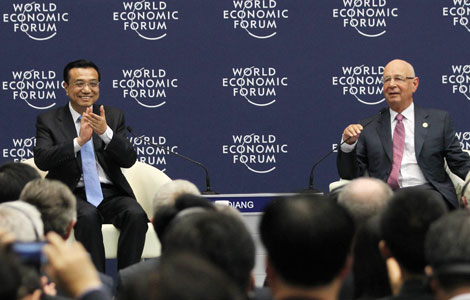

The State Council approved the establishment of the Shanghai Free Trade Zone on July 3, an endeavor that will catapult the city to the forefront of global financial, trade and logistics centers.
Covering 28.78 square kilometers, the new zone will be built on the basis of existing bonded ones, Waigaoqiao Free Trade Zone, Waigaoqiao Free Trade Logistics Park, Yangshan Free Trade Port Area and Pudong Airport Comprehensive Free Trade Zone.
The project, mapped out at the start of this year, is the first of its kind in China. Many view it as a prototype for similar zones in other cities that could help bolster the national economy amid a period of declining growth.
According to a statement by the Ministry of Commerce on August 22, the proposed zone will help China explore a new path of opening-up, accelerate the transformation of government functions and promote economic restructuring.
When completed, it will provide world-class transport and communications facilities and a tax-free environment for domestic and foreign enterprises, thus facilitating its role as a major hub for their supply chains in Asia.
Last month, the city released a series of detailed guidelines for policy changes. These included measures to allow more private capital in the banking sector, and ways to promote cross-border use of the yuan.
Shanghai will strengthen its role as a settlement center for international trade and pilot fund management for multinational companies' headquarters. It also looks to include more businesses in its inter-bank foreign exchange settlement plan.
The central government has yet to formally publish any detailed plans or set out a timeline for the free trade zone. However, it is seen as a platform on which to test a string of liberalization policies in a wide range of business sectors, including the banking, telecommunications, culture and entertainment industries.
A draft plan was submitted to the National People's Congress in August for approval that would suspend certain laws in the Shanghai Free Trade Zone in a bid to remove legislative hurdles for the pioneering undertaking.
The four pieces of ordinance under review are the Law on Foreign-capital Enterprises, the Law on Chinese-foreign Equity Joint Ventures, the Law on Chinese-foreign Contractual Joint Ventures and the Law on Cultural Relics Protection.
 Tesla, electric, hybrid cars at Frankfurt 2013 Motor Show
Tesla, electric, hybrid cars at Frankfurt 2013 Motor Show
 Supercars at Frankfurt 2013 Motor Show
Supercars at Frankfurt 2013 Motor Show
 Cars, models at Frankfurt 2013 Motor Show
Cars, models at Frankfurt 2013 Motor Show
 Concept cars at Frankfurt 2013 motor show
Concept cars at Frankfurt 2013 motor show
 Premier Li meets entrepreneurs, answers questions
Premier Li meets entrepreneurs, answers questions
 Premier stresses education equality
Premier stresses education equality
 Angry Birds theme park opens in E China
Angry Birds theme park opens in E China
 Consumer electronics fair opens in Berlin
Consumer electronics fair opens in Berlin